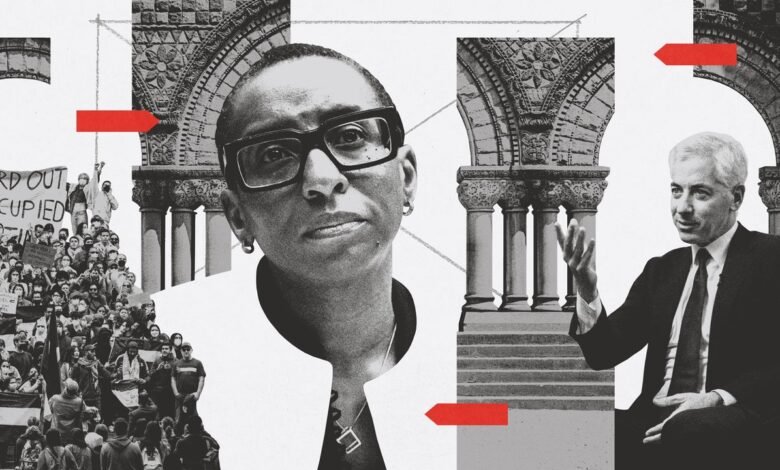The Campaign Against D.E.I. | The New Yorker

Critical race theory was yesterday’s scandal. Today, diversity-equity-and-inclusion initiatives are in the crosshairs of critics across the political spectrum who seek to dismantle any notion that racism is systemic and thus deserving of systemic remedies. Though the crisis at Harvard University began with questions concerning the prevalence of antisemitism and ended with charges of plagiarism against its president, Claudine Gay—who then resigned—for many of Gay’s opponents, D.E.I. initiatives appear to have been the main target. When the conservative activist Chris Rufo wrote in the Wall Street Journal about the role of conservatives, including himself, in ending Gay’s presidency, antisemitism and plagiarism received no meaningful mention. Instead, Rufo focussed on conservatives’ efforts to end D.E.I. in higher education. In his own long statement, Gay’s chief critic, the billionaire hedge-fund manager Bill Ackman, said that D.E.I. was the “root cause” of antisemitism on Harvard’s campus.
Antisemitism has been on the rise for some time, as was most dramatically demonstrated by the murders of eleven worshippers at the Tree of Life synagogue in Pittsburgh, in 2018. But the argument that D.E.I. programs, which were designed to address issues of discrimination, are themselves a source of bigotry is undermined by the reality that the people making it have suspect records on the subject. In 2021, during Kyle Rittenhouse’s homicide trial, Ackman lauded Rittenhouse—who shot three Black Lives Matter protesters in 2020—as a “civic-minded patriot.” More recently, when Elon Musk responded to a post on X that gestured toward the theory that Jews were responsible for flooding countries in the West with “hordes of minorities,” commenting that it was the “actual truth,” Ackman rushed to Musk’s defense, saying, “Elon Musk is not an antisemite.” He added that the “world is a vastly better place because of him.”
Beyond Ackman, the Republican Party’s newfound role of fighting antisemitism is most curious. In a poll taken in 2020, more than two-thirds of American Jews and more than half of U.S. adults said they believed that the G.O.P. holds at least some antisemitic views. Forty-nine per cent of American Jews believed that the “extreme political right” poses a “very serious threat.” These fears are founded: members of the Republican Party have trafficked in antisemitic conspiracy theories about Jews dominating various areas of finance, manipulating the media, and pulling the strings of the American left. In 2017, Trump notoriously referred to white supremacists who marched through the streets of Charlottesville, Virginia, chanting, “Jews will not replace us,” as “very fine people,” before he was compelled to decry white supremacy.
The Republican Party has become the main vector for the deeply antisemitic “replacement theory” that Jews are involved in a plot to inundate the U.S. with undocumented immigrants who will “replace” the waning white majority and keep the G.O.P. out of power. The Republican congresswoman Elise Stefanik, who challenged university presidents at the hearing on antisemitism on college campuses and gloated about her role in toppling Gay, went on to denounce the “institutional rot of antisemitism in Harvard.” But before she was known for her role in the hearing, Stefanik was thrust into the national spotlight after a white supremacist massacred ten African Americans at a grocery store in Buffalo, New York. In a rambling political manifesto, the shooter invoked “replacement theory” as a possible motivation for his rampage. Stefanik, a representative for upstate New York, who has described herself as an “ultra MAGA” warrior, had expressed the same idea in social-media ads claiming that Democrats were planning a “permanent election insurrection” to “overthrow our current electorate and create a permanent liberal majority in Washington.”
Even now, as the Republican Party claims to be committed to eradicating antisemitism on college campuses, its members have continued to invoke the name of the Holocaust survivor and Hungarian-born billionaire and philanthropist George Soros as the mastermind of mischief in American politics. Trump has branded the prosecutor Alvin Bragg, who is bringing criminal indictments against him in New York, as “Soros-backed.”. Republicans blamed the short-lived post-lockdown crime wave on Soros because his foundation had financed the campaigns of liberal prosecutors who have criticized racism in the criminal-justice system. Florida’s governor, Ron DeSantis, described the “Soros-backed prosecutors” as a “menace to society.”
In general, it is simply unbelievable that a political party in thrall to Trump is the leading light opposing antisemitism. What seems more likely is that the onset of another war in the Middle East created a political crisis, exemplified by support for Palestinian rights and criticism of Israel across college campuses. This crisis overlapped with existing concerns on the right about the political indoctrination of college students and the waning influence of the right among young people.
Indeed, when Republicans suffered unexpected losses in the 2022 midterm elections, the former Wisconsin governor Scott Walker complained on Twitter, “Younger voters are the issue. It comes from years of radical indoctrination – on campus, in school, with social media, & throughout culture. We have to counter it or conservatives will never win battleground states again.” To some, the outbreak of protests expressing hostility toward the state of Israel, even in the immediate wake of Hamas’s surprise attack on October 7th, offered more proof of this liberal indoctrination. As Rufo explained, “Following the outpouring of sympathy on elite campuses for Hamas’s war of ‘decolonization’ against Israel, many Americans—including center-left liberals—became aware of the ideological rot within academic institutions.” Even a moderate Democrat like Chuck Schumer has acted with alarm at the lack of support for Israel among young people since the Hamas attacks and since Israel’s bombing of Gaza. The war in the Middle East became an opportunity for opponents of D.E.I. and affirmative action to make common cause with political moderates and others who may not like Trump or even the modern G.O.P. After all, Ackman is no shill for the Republican Party. He is known to have donated hundreds of thousands of dollars to Barack Obama, Al Gore, and Pete Buttigieg.
This decline in support for Israel, along with rising support for Palestinian rights, has been recast by the right as antisemitism—which, in turn, has tapped into the old political debate over whether criticism of Israel is the same as irrational and racist attacks on Jews. A recent study conducted by the Anti-Defamation League, Hillel International, and College Pulse to “better understand the current state of the campus climate for Jewish students” found that seventy-three per cent of Jewish students have “experienced or witnessed some form of antisemitism” on campus. But their metrics for determining the climate on campus also included anti-Israel statements. Seventeen per cent of those surveyed said they had seen a “problematic post about Israel” by someone associated with their university. Nearly a third said that they had heard “problematic comments” about Israel, which the surveyors described as witnessing an antisemitic incident. When the A.D.L. released a new report tracking antisemitism, in January, it counted anti-Zionist demonstrations and protests as prima facie antisemitic. Of course, none of this means that antisemitism never animates critiques of Israel, but neither can it be assumed that any critique of Israel is motivated by antisemitism.
The criticism that university presidents allowed antisemitism to bloom across their campuses was, in large part, because they allowed antiwar protests that included searing criticisms of the state of Israel. Gay’s answers in the congressional hearing were lawyerly and cognizant that her Republican questioner was trying to lay a trap, but the charges of antisemitism were specious and unfounded. If anything, Gay, along with the two other university presidents who appeared in the hearing—Liz Magill, then the leader of the University of Pennsylvania, and Sally Kornbluth, of M.I.T.—had campaigned against antisemitism even when it spilled over into undermining the speech of pro-Palestinian activists and other critics of Israel’s siege of Gaza. The schools are establishing task forces and implementing other initiatives with the specific charge of rooting out antisemitism. They publicly criticized the phrase “from the river to the sea,” dismissing the idea that it is a legitimate part of the political debate about the future of Israelis and Palestinians, in one or two states.





